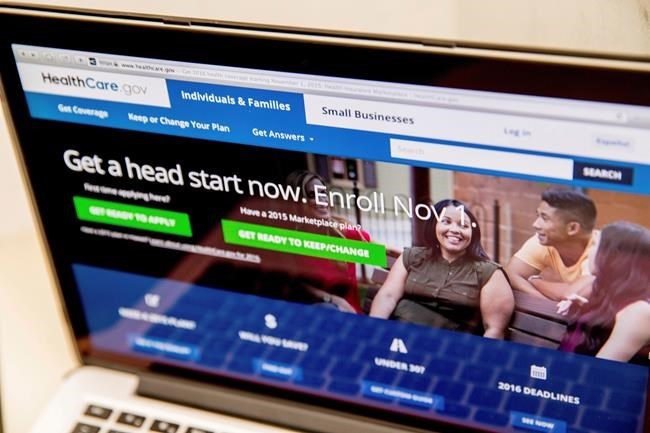
FILE - In this Oct. 6, 2015, file photo, the HealthCare.gov website, where people can buy health insurance, is displayed on a laptop screen in Washington. Worried that insurer exits from the health law’s markets may cause many people to lose coverage, the Obama administration plans to automatically pick a plan from a different carrier for affected consumers. But policyholders could get an unwelcome surprise if their government-recommended plan isn’t what they’re used to. The elaborate backstop was outlined in an administration document circulating among insurers and state regulators. It also calls for reaching affected consumers with a constant stream of reminders as the health law’s 2017 sign-up season goes into full swing. HealthCare.gov’s open enrollment for 2017 starts Nov. 1 and ends Jan. 31. A copy of the plan was provided to The Associated Press. (AP Photo/Andrew Harnik, File)
October 06, 2016 - 9:44 AM
WASHINGTON - The Obama administration is worried that insurers bailing out of the health law's markets may prompt their customers to drop out, too. So it plans to match affected consumers with remaining insurance companies.
The hope is to keep people covered, but there's concern that the government's match-making will create confusion and even some disappointed customers.
The new backstop was outlined in an administration document circulating among insurers, state regulators, and consumer groups. It also calls for reaching "discontinued consumers" with a constant stream of reminders as the law's 2017 sign-up season ramps up. Open enrolment for HealthCare.gov starts Nov. 1 and ends Jan. 31.
The insurance markets were envisioned as dynamic engines of private competition. But in many states, they have run into problems.
Some consumer advocates say this latest effort will help people retain coverage in a challenging year when premiums also are rising. Other advocates, however, worry it will cause confusion. Insurers fear a backlash from customers disappointed with reduced options. The administration says consumers have the last word on accepting any "alternate" plan they're offered.
"I'm concerned that the alternative plan will look like a 'recommended choice' by the marketplace," said Elizabeth Colvin, director of Insure Central Texas, an Austin non-profit that helps people sign up for coverage.
"The way it is presented could be interpreted as, 'This is a plan we recommend,' or 'This is a plan we think will work for you,' or 'this is one of the better plans,'" Colvin said.
The administration said it isn't able to provide an estimate of the number of people who'll get notices about their new plans. It could range from several hundred thousand to 1 million or more, say independent experts.
Big-name insurers are leaving the market because of financial losses and non-profit insurance co-ops are collapsing. Insurers say customers have turned out to be sicker than expected. Many younger, healthier people have stayed away, even at the risk of fines for being uninsured.
Markets such as HealthCare.gov provide subsidized private coverage for people who don't have a job-based plan. About 11 million people are currently covered.
The original idea was that competitive markets would force insurers to offer quality coverage at affordable prices. That tends to work in metro areas. But many rural communities and small cities will have just one carrier next year.
Democratic presidential nominee Hillary Clinton is calling for a stronger government role through the introduction of a public insurance plan.
With the markets struggling, administration officials worry that insurer exits could complicate their desire to deliver strong sign-up numbers in the president's last year. So they are leaving nothing to chance.
The administration document says affected consumers may get 20 or more reminder messages just between Nov. 21 and Dec. 15, which is the deadline for selecting coverage effective Jan. 1.
That could lead to problems if the government can't turn off the notices after a customer has picked a new plan. "Consumers panic and think something went wrong," said Colvin, the program director in Austin.
The earliest notifications will start this month. Around the second week of November, consumers whose insurers are leaving the market will get a notice that HealthCare.gov has matched them to another plan. They also could receive materials from the new insurer, including a welcome kit and a bill.
Christen Linke Young, an administration official overseeing the health care markets, stressed that consumers are under no obligation to accept the new plan.
"Under no circumstances is anyone going to be enrolled in a plan or need to pay anything without their consent," she said. "Consumers are getting an option, but they are not getting enrolled into that product without their consent."
Last year, most renewing customers checked their options before paying their first month's premium. But this year, they may not have other viable choices if they live in an area reduced to one insurer.
Displaced customers who fail to sign up by the end of open enrolment will get another chance to do so in 2017, what's termed a "special enrolment period."
The new policy will be effective in most states. In some cases, state regulators may have different rules.
Some consumer advocates say the administration is taking a reasonable step, since losing more customers would further weaken the markets.
"If you want as many people as possible to remain covered, what they are doing is a good idea," said Judy Solomon of the Center on Budget and Policy Priorities, which advocates for low-income people. "They are doing the best they can with a difficult situation on this one."
News from © The Associated Press, 2016